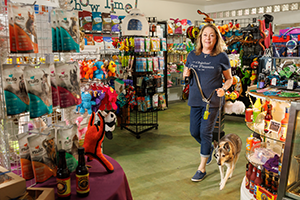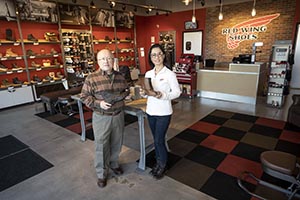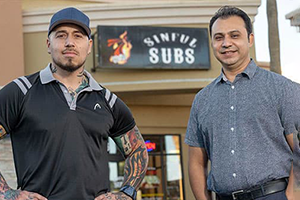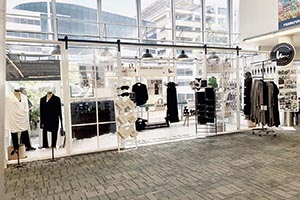We talked to three business owners about how they were navigating breakdowns in the once reliable supply chain. Their response? Just make it work.
Everyone has felt the effects of supply chain shortages and slowdowns recently. While lack of inventory can be frustrating for customers, for businesses it could mean having to close up shop. We spoke with business owners to get their perspectives on keeping doors open during this particularly stressful season.
George Hamby Painting, Maryville, TN
Having discovered a knack for home renovation projects by the young age of 17, George Hamby has been running his self-titled painting company in Maryville, Tennessee for the past 23 years. The inventory of available paint, like so many other home improvement products, has also been affected by the supply chain crisis. With a wide range of both commercial and residential clients to keep happy, Hamby relies on the support of his team and his scrappy sensibilities to make sure his inventory stays stocked.
“We all get on the phone,” Hamby said about trying to track down product. “If we're [needing] something, everybody is on the phone trying to call to find it.” For Hamby, scrappiness means driving to other parts of the country to find the paint he needs or ordering more than necessary so he stays ahead of his company’s demands. He has also broadened his vendor relationships, making the most of his network connections.
“We’re thinking outside the box more,” said Hamby. “You gotta roll with everything right now.”
Original Paw Pleasers, San Diego, CA
Loree Shirazi opened San Diego’s first dog and cat bakery over 29 years ago. In that time, she has experienced her fair share of ups and downs. Her advice? “Concentrate on what you can do, not on what you can’t do.” For Loree and her business partner and daughter Daniell, that means being flexible, reliable, and clever.
Compared to large companies, small businesses have the advantage of flexibility, says Loree. That freedom has allowed Loree to think outside of the box when problem-solving her low inventory issues. In one instance, Loree needed a supply of small chew sticks for dogs, but her vendor only had large ones available. She placed the order anyway, then trimmed down the larger sticks into smaller sizes.
In addition to custom dog cakes and cookies, Paw Pleasers also sells high-quality pet toys for dogs and cats. To make sure they’re always stocked, Loree has taken to placing smaller orders every day rather than ordering once or twice a month. She also keeps her inventory flexible, stocking new, available products when her traditional stock is unavailable. Because of her 29-year history with the community, Loree also stays loyal to her tried and trusted vendors rather than experimenting with new ones. “Everyone is just making it work this year,” she says.
Primo Supply, California
Even businesses in niche markets are feeling the stress of inventory and worker shortages. David Evraiff, founder of Primo Supply which distributes fire-fighting equipment and more, credits planning ahead as the reason his business is still fully functional. “I saw this coming a year ago,” said Evraiff, referring to the slowdown of shipments coming from China, his primary source of inventory.
Evraiff predicted these setbacks would continue, which is why he applied for an EIDL, also known as an Economic Injury Disaster Loan. With that assistance, his business was able to purchase a year’s worth of inventory, giving them more lead time for future inventory orders. “That’s the key to business,” said Evraiff. “You’ve got to stay ahead of it.”
Learn how these businesses pivoted during the pandemic and found creative ways to stay afloat.




























































